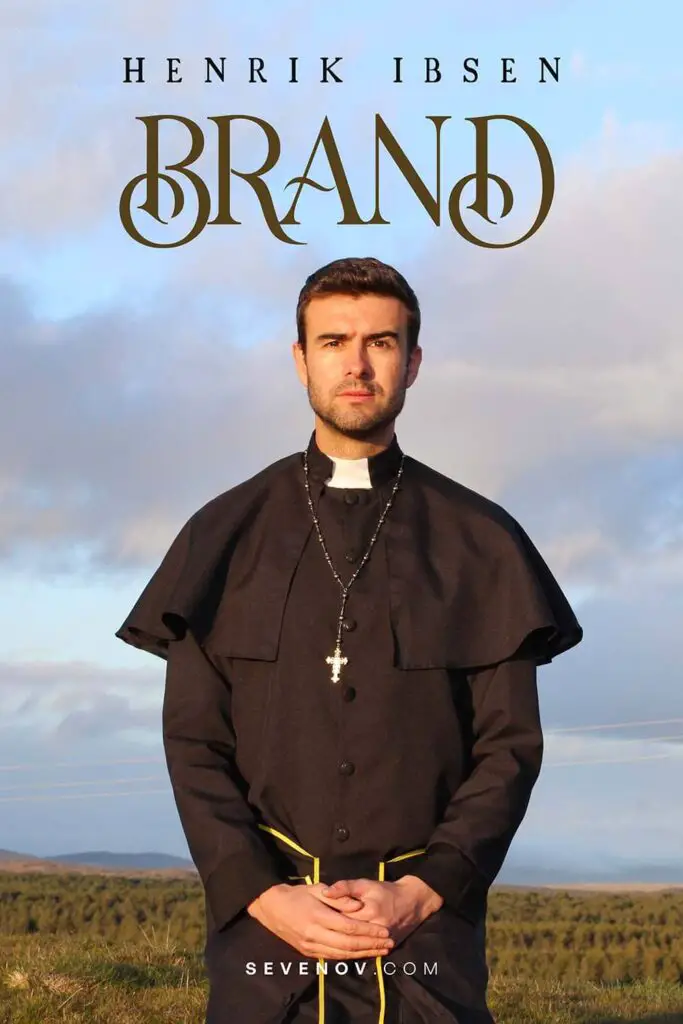
Brand by Henrik Ibsen
Author: Henrik Ibsen
Published: 1865
Genre: Tragedy
Brand is a verse play by the Norwegian playwright Henrik Ibsen. It was published in 1865 and first performed in 1867 in Stockholm, Sweden. The titular character is a priest who always subordinates love to duty. He holds an ‘all-or-nothing’ mentality and sacrifices everything to uphold his moral principles. Brand is a word that means ‘fire’ in Danish, Norwegian and Swedish.
1. Brand Synopsis
Brand is a priest who holds an ‘all-or-nothing’ mentality regarding morality. Though it greatly pains him, he sacrifices family, friends, and happiness for his convictions. Brand’s worldview isolates him since few are willing to follow his example. Nevertheless, he persists in his mission to save human souls from sin. After dedicating his whole life to his ideals, he realizes they may have been deeply flawed.
2. Brand Summary
Act I
As the play opens, Brand meets several people while traveling with them to his home village in the mountains. The first is a peasant traveling with his son, who does not dare go straight through the mountains, preferring to go round instead. Brand scorns him for his cowardice. The peasant’s daughter lives over the mountains and will soon die, but he is unwilling to risk his life to see her one last time.
Brand then meets Einar, an easy-going painter, his fiancée Agnes, and a fifteen-year-old girl named Gerd, who hunts for a great hawk and believes there is a great church in the valley.
Einar and Brand went to school together. The two of them have a long discussion about God. Unlike Einar, who sees God as an old, compassionate man, Brand envisions a young, heroic God who is uncompromising and imperious. Brand thinks that people have gotten morally lax due to the belief that Christ has saved all from sin through his sacrifice.
Act II
Brand arrives at the valley where he was born and finds his hometown in famine. As the local mayor distributes rations to the hungry, a woman comes up looking for a priest. Her husband needs absolution as he killed one of his children rather than see him starve. He then harmed himself out of remorse and will soon die. Despite the danger of crossing the fjord in a storm, Brand agrees to go with the woman.
Agnes follows Brand, and Gerd encourages them. Brand manages to reach the woman’s husband in time, giving him absolution. Afterward, he ponders the fate of the remaining children, and some farmers arrive to demand that he stay on as their priest. he is reluctant at first but relents when they use his message of ‘all-or-nothing’ against him.
Brand’s mother appears, and it is revealed that Brand cannot forgive her as she robbed his father on his deathbed.
Impressed by Brand’s brave and uncompromising character, Agnes leaves her fiancé Einar to stay with him. Einar tries to dissuade her, but she insists on staying with Brand even if it means a life of unhappiness.
Act III
Years later, Brand lives with Agnes and their son, Alf. Alf is seriously ill, and the local doctor advises them to leave for a warmer climate. At the same time, Brand’s mother is dying, but he will not be her priest unless she gives all her money to charity. She is unwilling to comply with his demand, so Brand refuses to see her.
The doctor almost succeeds in persuading Brand to leave for the sake of his son. However, the farmers come and beg him to stay. Gerd also urges him not to go, saying that the congregation needs him to ward off evil. Ultimately, he chooses to stay, knowing it will cost his son’s life.
Act IV
After Alf’s death, Brand decides to build a larger church. He refuses to mourn his son and tells Agnes not to mourn either.
The mayor shares with Brand his plans to build a poor-house, a prison, and a political hall. He then reveals that Brand’s mother left her true love and married an old miser. Her lover later got into a relationship with a Roma woman, and Gerd is their child. Brand thus grew up as the child of a loveless marriage.
The mayor leaves, and a Roma woman arrives. She requests clothes for her freezing child, who is blue from the cold. Brand puts Agnes to the test, and she eventually gives all of Alf’s clothes to the woman, though it pains her greatly. She had been using these clothes to cope with her loss. Agnes cries that she is free after giving all of her dead child’s clothes away and dies.
Act V
A year and a half later, Brand’s new church is completed. The dean comes to speak with Brand and tries to convince him to cooperate with the state. He promises rising Brand to eminence, but Brand rejects his offer.
Einar returns as a missionary. He tells Brand that he wasted his life gambling but changed his ways after God took away his health. Einar does not mourn Agnes’ death but sees her as a seducer who deserved to die. Learning of his views, Brand rejects him.
Brand leads his flock into the mountains, but they struggle to endure the harsh conditions. The mayor and the dean fool Brand’s followers into thinking that a large quantity of fish has flooded the fjord. Desiring wealth and unable to take any more hardship, Brand’s followers chase him off with stones.
Brand reunites with Gerd, who believes that he is the savior. Gerd leads him to a glacier, and he recognizes it as the ‘Ice Church.’ She shoots at the great hawk she had been hunting, triggering an avalanche. As he dies, Brand cries out, “Does not salvation consider the will of man?”
An unknown voice replies, “He is the God of Caritas (love of humankind)!”
3. Characters
- Brand
- His mother
- A peasant and his son
- Einar
- Agnes
- Gerd
- A woman
- The Doctor
- The Mayor
- The Dean
- The Sexton
- The Schoolmaster
- Another woman
- Another peasant
- A clerk
- Priests and officials
- The Crowd
- The tempter in the wasteland
- The invisible choir
- A voice
4. Themes
4.1. Idealism vs. Realism
Brand is willing to sacrifice everything for his ideals. This commitment causes him to conflict with those with a more realistic worldview. Ultimately, his mission to save souls fails because his followers are unwilling to sacrifice their worldly comforts for spiritual salvation. They chase him away with stones once convinced that there is a wealth of fish in the fjord. It seems as though his idealism cannot triumph in a materialistic world.
Apart from exploring its conflict with realism, the play shows how idealism can be a double-edged sword. When taken too far, it can become dogmatism that harms oneself and others.
Brand’s idealism gives him the courage to face great danger and hardship. In pursuing his mission, he has to sacrifice his happiness, security, and even love for his family. He is uncompromising but not unfeeling; the sacrifice of his son and wife gives him intense pain. Despite his brave front, his immediate reaction to the potential loss of his family members is fear. What sets him apart from ordinary people is that he can suppress his emotions to fulfill ideological goals. He would not have the strength to do this without a firm faith in his ideals.
However, it is precisely his unwavering devotion to his ideals that causes Brand to harm others. He lets his innocent child die so that he can fulfill his duty as the spiritual leader of his followers.
Later, he pressures his wife to give away all of their dead child’s clothes to a poor Roma woman, knowing how valuable these clothes are to her. When she reveals that she kept one bonnet of Alf’s for herself, he is disappointed and reminds her of their ‘all-or-nothing’ philosophy. She gives in but dies of despair afterward. Brand is a zealot who applies black-and-white morality to a world filled with gray. He refuses to compromise on his ideals even if he has to hurt himself or others to uphold them.
4.2. Love vs. Duty
Brand is a person who places duty above love. His name means ‘fire’ and alludes to the burning passion with which he performs his religious duty. he does not perform his duties as a priest out of mere obedience to God. Instead, he views it as his life mission and will do anything in the name of these duties.
However, Brand’s name is ironic because he is without warmth, unable to sympathize with those who fail to live up to his ideals. When love conflicts with duty, he sacrifices love because he lacks compassion for others.
For instance, when he arrives at his famine-stricken hometown, he shows little concern for the starving peasants. Yet, he is willing to brave a storm to fulfill his religious duty of providing absolution to a dying sinner.
Even in the episode of the Roma woman, Brand’s concern was not the welfare of the woman’s freezing child but rather the salvation of his wife’s soul. He thinks she will not be saved if she does not sacrifice everything for her faith. He sees it as his duty to save souls, so he pushes her to give away all their son’s clothes, even the last bonnet she kept for herself.
The play suggests Brand’s willingness to place duty above love stems from his upbringing. He grew up under a glacier in a desolate place with little sunlight. His parent’s marriage was loveless, making it hard for him to understand the importance of love.
4.3. Sacrifice
Brand preaches a message of total sacrifice: give all or nothing. He knows this is painful and difficult, but he demands that others sacrifice everything once they have committed to his ideals. Likewise, he is uncompromising towards himself. However, he thinks that people should sacrifice out of their own free will. He does not force his wife Agnes to leave Einar or to give up on their son – he wants her to make that choice on her own.
Brand’s commitment to total sacrifice is based on his religious faith. He believes in an uncompromising God, not a merciful one. His god will only save those who have the will to follow his command in all circumstances.
Brand’s beliefs echo Kierkegaard’s philosophy of faith before reason. Kierkegaard was a Christian philosopher who believed that Abraham’s attempted sacrifice of Isaac was theologically justifiable as Abraham was committing to his faith in God. This faith is his highest duty and supersedes social norms. In the play, Brand also sacrifices his son, Alf, to fulfill his religious duty to his flock as their priest. He places his faith above everything else, even his love for his family and common sense.
Nevertheless, he comes to question the value of his sacrifice in the last act. Isolated and rejected by his flock, he flees into the mountains, where he meets Gerd. When she calls him ‘the Savior,’ he recoils and refers to himself as “the lowest worm crawling on the ground.” At this point, Brand realizes that all his sacrifice was for nothing. He has not managed to save the souls of his followers, who would rather chase worldly pleasures.
Moreover, the play shows that sacrifice can be self-serving. Brand thinks he is perfect, but he is, at the end of it, just a flawed human being. Sacrifice feeds his ego; when the doctor urges him to ‘be humane’ to his dying mother, Brand compares himself to God, saying, “Was God humane to his son?” However, he does not consider that he is not God; he cannot tell if sacrificing his mother’s dying wish to see him will serve a higher purpose.
| Henrik Ibsen Bibliography | |
| Dramas | Catiline | The Burial Mound | Norma, or A Politician’s Love | St. John’s Eve | Lady Inger of Ostrat | The Feast at Solhaug | Olaf Liljekrans | The Vikings at Helgeland | The Mountain Bird | Love’s Comedy | The Pretenders | Brand | Peer Gynt | The League of Youth | Emperor and Galilean | The Pillars of Society | A Doll’s House | Ghosts | An Enemy of the People | The Wild Duck | Rosmersholm | The Lady from the Sea | Hedda Gabler | The Master Builder | Little Eyolf | John Gabriel Borkman | When We Dead Awaken |




